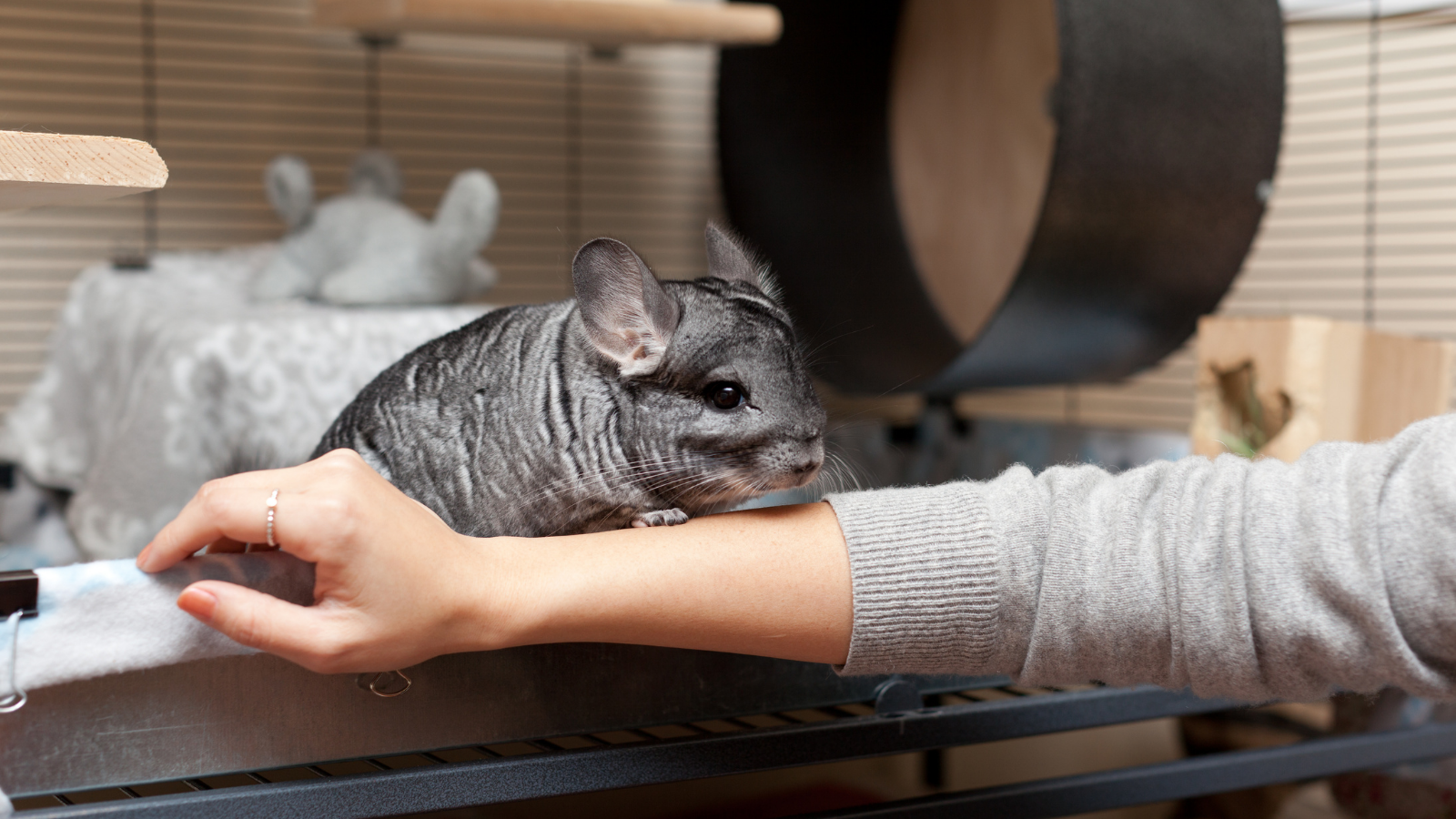Can You Train A Chinchilla: Expert Tips for Success
Have you ever wondered if you can train a chinchilla? These small, fluffy creatures are known for their playful and curious nature.
But can they learn tricks or follow commands like dogs or cats? If you want to build a stronger bond with your chinchilla and make daily care easier, understanding their training potential is key. Keep reading to discover how you can teach your chinchilla new behaviors, what to expect during training, and simple tips to get started right away.
Chinchilla Behavior Basics
Understanding chinchilla behavior is key to training them well. These small animals have unique ways of acting. Knowing their nature helps you interact better. It makes training easier and more effective.
Chinchillas show different behaviors based on their instincts and environment. Observing these habits helps in creating a strong bond. This section breaks down the basics of chinchilla behavior.
Natural Instincts
Chinchillas are prey animals. They stay alert and cautious. Their instinct is to hide from danger. They like dark, quiet places. They jump and climb a lot. These actions keep them safe in the wild. Understanding this helps in building trust.
Social Traits
Chinchillas are social creatures. They enjoy company and can form strong bonds. They communicate using soft sounds and body language. They like to groom each other. Social interaction reduces stress. Knowing this helps in training and care.
Common Habits
Chinchillas are active mostly at night. They love to chew on safe objects. Dust baths keep their fur clean. They often hop and explore their space. They may freeze when scared. Recognizing these habits guides your training approach.

Credit: www.vitalpetclub.co.uk
Setting Up For Training
Training a chinchilla requires careful preparation. Setting up the right space and tools helps make training easier. Creating a calm and safe place encourages your pet to learn. A steady routine also helps your chinchilla understand what to expect.
Safe Environment
Choose a quiet spot for training sessions. Avoid loud noises and sudden movements. Make sure the area is free from hazards like wires or sharp objects. Use a small, enclosed space to keep your chinchilla secure. This helps your pet focus and feel safe.
Necessary Supplies
Gather treats your chinchilla loves. Small, healthy snacks work best. Have a clicker or soft voice ready for praise. Use a comfortable mat or towel for your pet to sit on. Keep water nearby to keep your chinchilla hydrated during breaks.
Establishing Routine
Train at the same time each day. Short sessions, about 5 to 10 minutes, work well. Consistency helps your chinchilla learn faster. End each session with a treat or kind words. A regular schedule builds trust and focus in training.
Training Techniques
Training chinchillas takes patience and gentle methods. These small animals learn best with clear signals and rewards. Using effective training techniques helps build trust and encourages good behavior. Here are some common methods that work well for chinchillas.
Positive Reinforcement
Positive reinforcement means giving a reward for good behavior. Treats like small nuts or dried fruit work well. Praise and gentle petting also help. This method makes chinchillas want to repeat the action. Avoid punishment. It can scare or confuse your pet.
Clicker Training
Clicker training uses a small device that makes a clicking sound. The click marks the exact moment your chinchilla does something right. Follow the click with a treat. This helps your pet link the sound to a reward. The clear signal speeds up learning.
Target Training
Target training teaches chinchillas to touch an object with their nose. Use a stick or a small ball as the target. Each time they touch it, give a treat. This method guides your pet to move or follow commands. It builds focus and cooperation.

Credit: www.wikihow.pet
Teaching Basic Commands
Teaching basic commands to a chinchilla helps build a strong bond. It also makes daily care easier and more enjoyable. Training chinchillas is possible with patience and gentle methods. Start with simple commands to keep their attention and avoid stress.
Short sessions work best. Keep training fun and reward your chinchilla with treats. Use clear, consistent words for each command. This helps your pet understand and respond better.
Recall Training
Recall training teaches your chinchilla to come when called. Use a soft voice and say their name clearly. Show a favorite treat as a reward. Start in a small, quiet area with few distractions. Repeat often to build a habit. This training helps keep your chinchilla safe.
Handling And Trust
Handling training helps your chinchilla get used to being touched. Gently pet and hold them for short times. Speak softly to keep them calm. Trust builds slowly through patient, kind care. Avoid sudden movements to prevent fear. Trust makes all training easier and more effective.
Trick Training Ideas
Trick training adds fun to your routine. Teach simple tricks like standing on hind legs or spinning. Use small treats to reward each step. Break tricks into tiny parts for easy learning. Keep sessions brief and positive. Tricks strengthen your bond and keep your chinchilla active.
Common Challenges
Training a chinchilla can be a fun experience. It also comes with challenges. These small animals have unique needs. Understanding these challenges helps in successful training. Patience and care make a big difference.
Dealing With Shyness
Chinchillas are naturally shy creatures. They need time to trust humans. Sudden moves or loud noises scare them. Start training in a quiet, calm place. Let your chinchilla explore before you begin. Gentle talking can help build comfort. Avoid forcing interaction too soon. Small steps create a stronger bond.
Avoiding Stress
Stress affects chinchilla behavior and health. Training sessions should be short and calm. Watch for signs of stress like freezing or hiding. Stop if your pet seems upset. Use treats and soft voices to soothe. Avoid bright lights and loud sounds. A relaxed chinchilla learns faster and better.
Patience And Consistency
Training takes time and effort. Repeat commands gently and regularly. Use the same words and gestures each time. Celebrate small progress with rewards. Do not rush or punish mistakes. Consistent routines help chinchillas understand. Patience builds trust and good habits over time.
Health And Safety Tips
Training a chinchilla can be fun and rewarding. Keeping your pet healthy and safe is very important. Understanding key health and safety tips helps create a happy environment. These tips cover diet, exercise, and stress signs. Follow them to support your chinchilla’s well-being.
Diet And Nutrition
Chinchillas need a balanced diet to stay healthy. Their main food should be high-quality hay. Avoid giving sugary or fatty treats. Fresh water must always be available. Small amounts of pellets can supplement their diet. Fresh vegetables or fruits are not recommended often. A good diet helps prevent health problems.
Exercise Needs
Chinchillas are active animals. They need daily exercise to stay fit. Provide a large cage with shelves and toys. A safe exercise wheel is also useful. Let your chinchilla explore outside the cage in a secure area. Regular movement prevents obesity and boredom. Exercise supports both physical and mental health.
Recognizing Stress Signs
Stress affects chinchilla health and behavior. Watch for changes in eating habits or activity. Loud noises, rough handling, or new environments can cause stress. Signs include fur chewing, hiding, or aggression. Early detection helps reduce stress quickly. Calm and quiet surroundings keep chinchillas comfortable.
Maintaining Progress
Maintaining progress is key to successful chinchilla training. Consistency keeps your pet engaged and helps skills stick. Without regular effort, your chinchilla may forget what it learned. This section explains how to keep training effective and fun.
Regular Practice
Practice every day to keep skills fresh. Short, frequent sessions work best for chinchillas. Use treats and gentle praise to encourage good behavior. Repeat commands in a calm, clear voice. This helps your chinchilla understand and respond well.
Adjusting Training Plans
Watch your chinchilla’s reactions closely. Change your training methods if progress slows. Try new rewards or different commands to spark interest. Adapt training to your chinchilla’s mood and energy levels. Flexibility keeps learning enjoyable and effective.
Celebrating Success
Celebrate small wins to motivate your chinchilla. Give extra treats or playtime for good behavior. Positive reinforcement builds trust and eagerness. A happy chinchilla learns faster and stays engaged. Celebrate each step to make training a joy.

Credit: www.wikihow.pet
How Smart Pets Lover Can Help You with Can You Train A Chinchilla
Practical Learning Opportunities with Your Chinchilla
Understanding chinchilla behavior basics is the key to unlocking effective training sessions. Observing your pet’s natural quirks helps tailor your approach, making learning both fun and stress-free. For instance, setting up for training in a calm, familiar space encourages your chinchilla to feel safe and curious, which enhances responsiveness.
As you teach basic commands, like coming when called or gentle handling, remember that patience and consistency are your best tools. Challenges such as their sensitive nature or bursts of energy are common, but with thoughtful techniques, progress is achievable. Maintaining progress through regular, short sessions keeps your chinchilla engaged without overwhelming them.
At Smart Pets Lover, we’re passionate about helping pet parents build confident, caring bonds with their animals. If you want more tailored advice or have questions about chinchilla care, connecting with a local exotic pet vet or experienced trainer can be invaluable. This journey of training your chinchilla not only strengthens your connection but also adds joyful moments to your daily life.
Frequently Asked Questions
Can You Train A Chinchilla To Do Tricks?
Yes, chinchillas can learn simple tricks like jumping or coming when called. Use gentle rewards and patience during training.
How Long Does Chinchilla Training Usually Take?
Training time varies but typically takes a few weeks. Consistent daily sessions help chinchillas learn faster and better.
What Is The Best Way To Train A Chinchilla?
Positive reinforcement with treats and soft praise works best. Avoid harsh methods to keep your chinchilla happy and motivated.
Can Chinchillas Be Trained To Use A Litter Box?
Yes, chinchillas can be litter trained. Place a litter box in their cage and reward them when used correctly.
Conclusion
Training a chinchilla takes patience and gentle care. Small steps work best to teach new habits. These animals enjoy routine and calm environments. Positive rewards help them learn quickly and happily. Remember, each chinchilla learns at its own speed. Keep sessions short to hold their attention.
With time, you can build trust and skills. Training deepens your bond and makes care easier. Enjoy the process and celebrate small wins. Your chinchilla will thank you with trust and fun.






